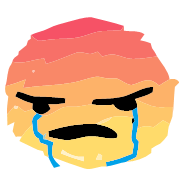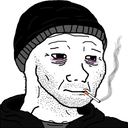originally posted in the megathread but want to make this a more active plea.
seeing the current 'YA good classics boring' discourse on the timeline is making me negatively polarized into finally sitting down and locking in. a lot of people are unread and proud at the moment and I'm embarrassed to be in the same general set as them. I'm a manga/LN/WN/fanfic-head, I used to be an avid reader as a pre-tween (like, 6-8) but all I really remember out of my childhood escapades is Hitchhiker's Guide and fucking Hatchet, and then I got the 'lazy student sparknotes' bug in middle school, and now my primary engagement with reading is stuff published by others online (homestuck (regrettably), parahumans, perusing mangadex and ao3, etc.)
please share your recommendations, I'm grabbing what I know but I want to broaden my horizons here. doesn't have to be the classics exactly, just, like, serious (don't know how else to describe it). I'm not trying to be elitist, really just want to be better read.
current backlog thus far obtained purely through osmosis, very little prior interaction:
- Pride and Prejudice – Jane Austen
- Jane Eyre – Charlotte Brontë
- Wuthering Heights – Emily Brontë
- Three-Body Problem – Liu Cixin
- House of Leaves – Mark Z. Danielewski
- White Noise – Don Delillo
- American Psycho – Bret Easton Ellis
- Dune – Frank Herbert
- Ulysses – James Joyce
- The Dispossessed – Ursula K. LeGuin
- One-Hundred Years of Solitude – Gabriel García Márquez[1]
- Blood Meridian – Cormac McCarthy
- The City and The City – China Miéville
- October – China Miéville
edit: that's a lot of recs! keep em coming, I very much appreciate it ![]()
I'm gonna wait till I have a chunk of time to parse through these before I further fill out my backlog here
rec'd to me by this thread ↩︎

I know that feel
The Alchemist by Paulo Coelho: an Oprah's book club classic, this will change your lifejk please do not take this suggestion seriouslySeconding 100 Years of Solitude, it is amazing.
The Overstory was really good, if a bit depressing (also featuring MMOs as described by an aging boomer who doesn't spend all his time on the internet).
Re: Ulysses, this is Joyce at his more experimental (Finnegan's Wake being his most experimental); you might appreciate it more if you start with something earlier like Portrait of the Artist as a Young Man.
Virginia Woolf: To the Lighthouse, Mrs. Dalloway, The Waves. You can't really go wrong.
The Sparrow by Mary Doria Russell is excellent; see also the sequel Children of God
Pilgrim at Tinker Creek is nonfiction but if you love navel-gazey nature writing, it's excellent.
Starting to realize most of the things on this list are books I read more than a decade ago
Moving on!
Persepolis and Fun Home are good examples of graphic novel storytelling that aren't just (as they say) capeshit.
The Master and Margarita is fun.
Nabokov: Lolita can be a heavy read; consider Pale Fire. He's really one of the most brilliant novelists the English language has ever had.
If you want to bridge the gap between YA and classic lit, Deathless is considered YA but also densely packed with references to Russian folklore and culture
I dunno, there's probably tons of stuff I'm forgetting. I really need to figure out why I don't read anymore (it is because I'm always on the internet and also have a bunch of journal articles sitting on my desk)
Seriously consider diversifying your literary diet with poetry; it's one of the things fascists love to destroy because it's a nonsystematic and obscure way of perceiving and communicating about the world, and most high school English classes are crap at actually telling you why you should want to read poetry as opposed to just breaking down the nuts and bolts and tossing a few Shakespeare sonnets your way. Nine Gates and The Triggering Town are good reads (and The Triggering Town is short).
As someone who did start Joyce with Ulysses, I would add as my advice that the best way to read Ulysses is just to read Ulysses, if something about the text chafes or feels like an obstacle on a first read, it's probably easier to just plow through that bit and then get into the academics afterwards to get a better picture of the specific questions that come up.
Fair enough, my intro to Joyce was by way of Beckett, so I took the long way around.
Dubliners is great as well